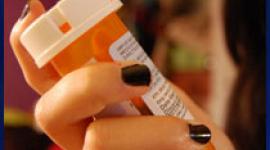Eating Disorders Prevention: What You and Others Can Do
There are so many things that society and we as individuals can do to help prevent the spread of eating disorders like anorexia and bulimia. Described here are just some of them.
being.aware
Awareness plays a big role in eating disorders prevention in that many parents and teachers don't even know the first signs of an eating disorder. Things like the "blues" and going on a "diet" seem trivial and just a phase to someone, while for the person it can be the beginnings of chronic depression and anorexia/bulimia. Blowing such things off as minor phases tells the person that their problems aren't that big, don't matter, and that they themselves don't have to worry about them. This only aggravates the eating disorder even more and will cause the person to go into denial about their issues.
spreading.awareness
Awareness about anorexia and bulimia needs to be spread to middle, high school, and college campuses. Unfortunately, sometimes eating disorders just end up being glamorized and seen as a quick way to lose weight, and also something that people can control, so it is very important that while spreading awareness it is made clear just how easily these demons smash dreams and ruin the lives of those suffering, along with the pain it causes for the families and friends of those suffering.
the.mask
 Another aspect of eating disorders prevention is to know that just because someone looks "fine" on the outside doesn't mean that they are fine on the inside. Eating disorder sufferers often trivialize their problems and lie because they feel that they would only be a burden to others if they shared their pain. Because many sufferers wear a mask of happiness, parents and teachers are easily fooled into thinking that the child is fine. Realize that this is just a mask, and that is all it will ever be. It is not the person's true feelings. The person may claim that they are fine when you ask them what is wrong, but don't take this as the truth. Inside they are depressed and tortured by their feelings, and they need someone to talk to and listen to them without getting angry, criticizing their emotions, telling them to ignore their feelings, or responding back with just "not having time" for their problems. Delve deeper into his or her's problems and make sure that when they say they are "fine," that it is just not another mask or the eating disorder trying to throw you off. Keep track of your student or child's self-esteem as well. Let them know that they are doing a good job, that you are proud of them, or that they have accomplished a lot, but don't make your comments solely or mostly based around food. This can lead a person to believe that their worth is associated with food.
Another aspect of eating disorders prevention is to know that just because someone looks "fine" on the outside doesn't mean that they are fine on the inside. Eating disorder sufferers often trivialize their problems and lie because they feel that they would only be a burden to others if they shared their pain. Because many sufferers wear a mask of happiness, parents and teachers are easily fooled into thinking that the child is fine. Realize that this is just a mask, and that is all it will ever be. It is not the person's true feelings. The person may claim that they are fine when you ask them what is wrong, but don't take this as the truth. Inside they are depressed and tortured by their feelings, and they need someone to talk to and listen to them without getting angry, criticizing their emotions, telling them to ignore their feelings, or responding back with just "not having time" for their problems. Delve deeper into his or her's problems and make sure that when they say they are "fine," that it is just not another mask or the eating disorder trying to throw you off. Keep track of your student or child's self-esteem as well. Let them know that they are doing a good job, that you are proud of them, or that they have accomplished a lot, but don't make your comments solely or mostly based around food. This can lead a person to believe that their worth is associated with food.
the.power.of.listening
Listening is extremely important. When someone comes to you either asking for help or just to let you know that something is not right, make sure you listen. To stop an eating disorder from forming in the beginning you must listen and talk with your child or friend regardless of how trivial the problem seems to you. Remember that even though the issue may not seem that important to you, it can be causing a huge impact on another person's life.
If your child comes to you about a problem in school, please just spare 5 minutes of your time; sit and just listen. For example, say your child comes home from school and lets you know that kids are bullying them or making fun of them. Most parents would blow this issue off as just regular "kid stuff" that they do at that age, but to the child this can really hurt them. Instead of criticizing your child or turning them away because you think this problem is "so small," listen and let him or her know that you are here for them if they want to talk, and if the abuse from the other children continues be sure to go down to the school and have a talk with the administrators. I know that for me I was constantly made fun of and told I was fat, ugly, etc., by other children in school. I was too scared to tell anyone about this because I knew the teachers could care less and my parents had problems of their own, so I shoved bit after bit of food down my throat to comfort the pain I was feeling. Then I spit it all back up to numb the world away. What seems like minor comments or teasing to you can really damage the self-esteem and worth of another.
Listening is also very important in relation to not just school and friends, but of course family problems. Eating disorder sufferers have often grown up in a household where true feelings could not be expressed. They have been told to not be a bother with their feelings because mommy is sick or the father has a drinking problem, and the child cannot bring up their own issues. However, the whole idea that as long as the problem is "out of sight, it's out of mind" is wrong. Since the child can't bring up their emotions and feelings, they instead go to food or reject it in order to deal with the pain and chaos. By not letting a person express their issues at an early age, before an eating disorder, you are also teaching them that having feelings are "wrong" and that they are unacceptable - that it is not ok to feel.
When we wore a heart of stone we wandered to the sea
Hoping to find some comfort there yearning to feel free
And we were mesmerized by the lull of the night
and the smells that filled the air
And we laid us down on sandy ground
it was cold but we didn't care-Sarah McLachlan
"casual".dieting
Realize, also, that if you, as a parent or close family member, are dieting constantly that your child will inevitably pick up these habit patterns as well. If your child or a friend says that they have gone on a diet, it is important that you watch that their 'diet' doesn't get out of control. Purging or not eating is never an acceptable way to lose weight and will only endanger their health and yours as well. Always remember that eating disorders spawn from emotional problems inside of the person, and cannot be solved through "dieting."
To better understand how you can prevent and look out for an eating disorder in a friend, your child, a student, or a patient if you are a doctor, I have added some comments that my friends have been gracious enough to let me print here in cyberspace. Each one of them suffers from an eating disorder.
One comment from a sufferer shows just how easily it is to be caught into the trap of an eating disorder:
"I thought I could control this, I thought it was my control. Because I couldn't see myself right I believed that my feelings about myself were actual facts, so I kept on losing weight. I was always regarded as the 'perfect' child. No one thought that I could possibly have an eating disorder, not perfect little Veronica. I didn't tell anyone about my problem with food for fear that they would think I was a psycho or hate me for having this problem, or just problems in general. For that I've been in and out of hospitals and I've ruined my life. It was only until my third hospitalization that I realized just how much I was truly out of control, and just how much the eating disorder was. It's too bad I couldn't have just realized this about 3 years ago. Maybe it wouldn't have been so hard to recover then."
A male victim recalls how his eating disorder, bulimia, started and how it progressed:
"We had to do a report in health class on eating disorders and I learned that you could lose some kind of weight by puking up what you ate (bulimia, binging and purging). I totally forgot about the medical problems that you get from it, which was what our whole reports were about. I just started doing it. I was caught once by a family member, but they figured that it was no big deal and when my folks found out that I was doing it everyday, they didn't really do anything. I figured they just didn't give a damn about me and I got even worse. The thing is, I never thought I'd be this bad. I thought I could start and stop, but I was so stupid in thinking that 'cause this is an addiction. I should've listened to what my other friend (who also has an ED) had told me in the beginning, but I was too hell-bent on doing my own thing and now I'm stuck with this without a clue as to how to stop."
"I wanted to be liked, that's all I wanted. I guess instead of getting other people to like me, I should have gotten myself to like me. Only, I didn't have a 'me'. I never knew what I liked or what I wanted to do, or what I should be. I just went with what others thought was best because I was too afraid to have a difference of opinion and cause conflict. I thought others would think that I was stupid for what I may like. When the eating disorder came along, I thought that that was finally 'me'. I was a starver, a bag of bones. The ED told me that if I just lost more and more weight that with each fallen pound, someone would finally like me. But with each pound lost, I started feeling worse and worse. I did get more attention, but then it got out of control and my friends and family went away because my obsession caused me to be depressed and isolate myself.
I haven't recovered yet. I've been to treatment and I've had doctors tell me I'm going to have to be hospitalized or I'll die, but I just can't stop. Who am I without the anorexia?"
As I've said so many times, recovery IS always possible. When an eating disorder does form there is no need to blame yourself or those around you - the most important thing is to work towards recovery. I only made this page in hopes that as a parent, friend, or teacher you can look within yourself and at others and be able to recognize someone that is on the verge of developing a full-blown eating disorder. Eating disorders prevention truly is the key.
next: The Truth on Laxatives, etc.
~ all peace, love and hope articles
~ eating disorders library
~ all articles on eating disorders
APA Reference
Staff, H.
(2008, December 20). Eating Disorders Prevention: What You and Others Can Do, HealthyPlace. Retrieved
on 2025, December 15 from https://www.healthyplace.com/eating-disorders/articles/eating-disorders-prevention-what-you-and-others-can-do



